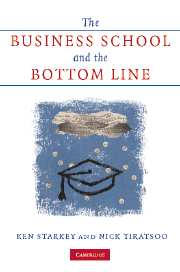Book contents
- Frontmatter
- Contents
- List of tables
- Acknowledgements
- Prologue
- 1 Introduction
- 2 The development and diffusion of the business school
- 3 Business schools in the era of hyper-competition: ‘more “business” and less “school”’
- 4 Business school education
- 5 Business school research
- 6 Experiments and innovations
- 7 Imaginary MBAs
- 8 Business school futures: mission impossible?
- Epilogue
- Index
6 - Experiments and innovations
Published online by Cambridge University Press: 02 December 2009
- Frontmatter
- Contents
- List of tables
- Acknowledgements
- Prologue
- 1 Introduction
- 2 The development and diffusion of the business school
- 3 Business schools in the era of hyper-competition: ‘more “business” and less “school”’
- 4 Business school education
- 5 Business school research
- 6 Experiments and innovations
- 7 Imaginary MBAs
- 8 Business school futures: mission impossible?
- Epilogue
- Index
Summary
In the previous chapters we have looked at the business school scene today in some detail, and underlined our belief that there is much to be uneasy about. We do not wish to suggest that the situation is wholly gloomy, however. As will have become clear by now, many are equally critical of what is currently taking place in business education, and, against this background, some – at least – have taken the bull by the horns and have aspired to introduce genuine changes. The most common move is to experiment with courses and research programmes that seek to close the gap between ‘theory’ and ‘practice’, and thus bring the academy into better balance with its stakeholders. In the following pages we explore some examples of constructive innovation, and attempt to evaluate their quality and effectiveness.
REFASHIONING THE MBA: ‘CAN A NEW BUSINESS SCHOOL TEACH TECHIES TO LEAD?’
One trend that is occurring on both sides of the Atlantic is a reassessment of the MBA so as to make it more suited to the way that business is currently evolving. In a knowledge society, so the argument runs, boundaries between different specialisms are dis-solving rapidly. What companies need are polymaths – in a nutshell, managers who are as at home discussing the latest technologies as the intricacies of business strategy. In this scenario, training and education need to adapt accordingly. One outcome of this line of reasoning has been a series of initiatives aimed at moving the MBA away from its traditional roots, towards entrepreneurship and the natural sciences. In 2004 Queen Mary College, part of the University of London, introduced an MBA in technology management and innovation.
- Type
- Chapter
- Information
- The Business School and the Bottom Line , pp. 140 - 168Publisher: Cambridge University PressPrint publication year: 2007



